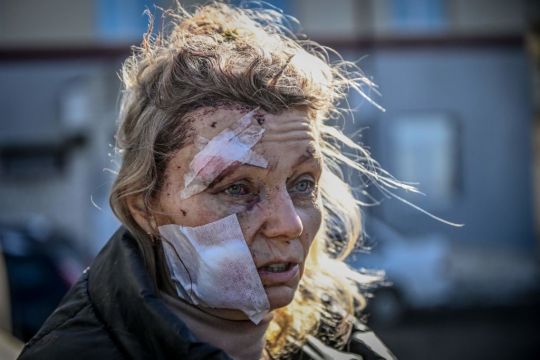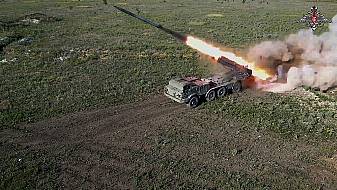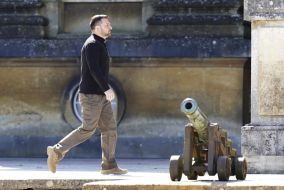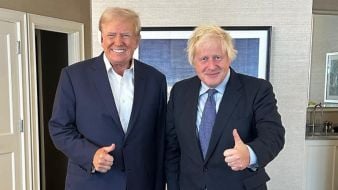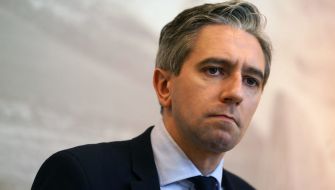Russian forces invaded Ukraine by land, air and sea on Thursday, confirming the West's worst fears with the biggest attack by one state against another in Europe since World War II.
Ukraine's Health Minister Oleh Lyashko said 57 people had been killed and 169 wounded on Thursday.
Here is a timeline of the day's main developments.
10.10pm: Thousands of Ukrainians fleeing war with Russia started arriving in neighbouring central European countries on Thursday and the region braced for many more, setting up reception points and sending troops towards the borders to provide assistance.
9.55pm: Ireland's embassy in Kyiv has ceased operating.
The ambassador and other staff have been moved to a secure location as fighting continues in Ukraine.
A dedicated helpline has been set up for Irish citizens in the country on 01 613 1700.
9.30pm: Shocked Russians turned out in their thousands to condemn their country’s invasion of Ukraine as emotional calls for protests grew on social media.
Some 1,702 people in 53 Russian cities were detained, at least 940 of them in Moscow.
9pm: Ireland will back the “strongest possible and most comprehensive” package of sanctions against Russia to punish the country for its invasion of Ukraine, the Taoiseach has said.
8.30pm: Russian President Vladimir Putin said his aim was to demilitarize and "denazify" Ukraine.
8pm: Ukraine's Health Minister Oleh Lyashko said 57 people had been killed and 169 wounded on Thursday.
7:30pm: A Russian AN-26 military transport aircraft crashed in Russia's southern Voronezh region on Thursday, killing its crew on board, Interfax news agency quoted Russian military officials as saying.
6.55pm: Russia's military attack on Ukraine is taking place as US officials had predicted, President Joe Biden said on Thursday, describing the invasion as "unprovoked".
"For weeks, we have been warning that this would happen, and now it's unfolding largely as we predicted," the president said in a statement at the White House.
6.30pm: Ukraine has lost control of the Chernobyl nuclear site, where forces had waged a fierce battle with Russian troops, a presidential adviser says.
6pm: Russian forces rained missiles on Ukrainian cities, including the capital Kyiv, and landed troops on its Black and Azov Sea coasts on Thursday, in the biggest attack by one state against another in Europe since World War Two.
5.45pm: An emergency summit starting at 1900 GMT will also discuss offering EU candidate status to Ukraine, Lithuania's President Gitanas Nauseda said, a step Kyiv has long called for, though it may not win approval from all EU leaders.
5.40pm: European Union leaders will impose new sanctions on Russia, freezing its assets, halting its banks' access to European financial markets and hitting "Kremlin interests" over its invasion of Ukraine, senior officials said on Thursday.
5pm: Ukraine’s leadership said at least 40 people had been killed so far in what it called a “full-scale war” targeting the country from the east, north and south.
4.10pm: Ukraine’s president said Russian forces were trying to seize the Chernobyl nuclear plant, site of the world’s worst nuclear disaster, and Ukrainian forces were battling other troops just miles from Kyiv for control of a strategic airport.
3.30pm: Dozens of Ukrainians gathered outside Leinster House on Thursday to express their anger at the Russian assault on their country.
The crowd chanted, waved Ukrainian flags and carried placards attacking the full-scale invasion launched by Russian president Vladimir Putin.
Politicians joined the protesters over the course of the afternoon, including Tánaiste Leo Varadkar and chairman of the Oireachtas Foreign Affairs Committee Charlie Flanagan.
3pm: World leaders have reacted to Russia’s invasion of Ukraine with raw outrage – and vows of unprecedented sanctions – that shrouded a sense of powerlessness to defend Ukraine militarily without running the risk of a wider war in Europe.
2.45pm: Russian troops have launched a broad assault on Ukraine from three sides in an attack that brought explosions before dawn to the country’s capital Kyiv and other cities.
2.40pm: Roman Abramovich should no longer be able to own Chelsea Football Club, according to an MP.
2:30pm: Uefa is set to confirm on Friday this season’s Champions League Final will no longer take place in St Petersburg.
1.55pm: Ukrainian President Volodymyr Zelenskiy said he was waiting for Ukraine's allies to impose concrete sanctions on Russia, as the military said four ballistic rockets had been fired at Ukrainian territory from the territory of Belarus. In the eastern Ukrainian city of Mariupol, the city council said shelling had hit a residential area and the number of casualties was being ascertained.
1.45pm: Russia's defence ministry said it had destroyed 74 above-ground military infrastructure facilities in Ukraine on Thursday, including 11 aerodromes, the RIA news agency reported.
1.30pm: Irish politicians on Thursday urged the Government to respond strongly to the crisis in Ukraine, with Sinn Féin’s Pearse Doherty urging Tánaiste Leo Varadkar to ensure that there is a clampdown on Russian money moving through the country.
In his response, Mr Varadkar said that Ireland would back tough new sanctions on Russia and would “not be putting any selfish or economic interests ahead of responses required.”
1.10pm: Italian Prime Minister Mario Draghi said the West will do everything necessary to restore full Ukrainian sovereignty over its lands, promising tough sanctions against Russia for invading its neighbour. Speaking in a televised address, his comments echoed a famous pledge he made in 2012, when he was president of the European Central Bank, to do "whatever it takes" to save the euro.
12.55pm: An upcoming second EU sanctions package will hit Russia's economy severely, increasing capital outflow, raising inflation and gradually eroding its industrial basis, EU Commission chief Ursula von der Leyen said on Thursday. "Our measures will weaken Russia's technological position in key areas from which the elite makes most of their money," she said.
12.40pm: Hungary condemns Russia's military attack on Ukraine, Prime Minister Viktor Orban said on Thursday. Orban said Hungary would stay out of the military conflict as the security of Hungarians was the most important, but it was prepared to receive people fleeing Ukraine.
12.25pm: The Ukrainian foreign ministry said on Thursday it had recalled its charge d'affaires in Russia for consultations and begun evacuating its embassy in Moscow. Ukrainian President Volodymyr Zelenskiy had said earlier Kyiv had cut diplomatic ties with Russia.
12.20pm: Ukraine on Thursday fought Russian forces along practically its entire border with Russia, and there was fierce fighting in the regions of Sumy, Kharkiv, Kherson, Odessa and at a military airport near Kyiv, an adviser to the presidential office said. The Ukrainian official said they feared that Russian forces could be air dropped into the country and then try to penetrate the government district in Kyiv.
12.10pm: The West will impose massive sanctions to "hobble" the Russian economy, British Prime Minister Boris Johnson said on Thursday in a televised address to the nation. "We will do what more we can in the days ahead," he said on what further support Britain would give to Ukraine.
12.05pm: Turkey supports Ukraine's battle for territorial integrity and views Russia's attack as a "heavy blow" to regional stability and peace, President Tayyip Erdogan said on Thursday, repeating a call for a resolution of the crisis through dialogue.
11.55am: Lithuania's president declared a state of emergency on Thursday, telling the Nato country's army to deploy along its borders in response to "possible disturbances and provocations due to large military forces massed in Russia and Belarus". The state of emergency will be valid for two weeks.
11.40am: In Ireland, Taoiseach Micheál Martin spoke to the media before flying to Brussels for an emergency EU summit. He said the EU will adopt the “most severe package of sanctions we have ever considered,” aiming “to hit Putin and his henchmen where it hurts most.”
Mr Martin said the Russian invasion “presents Europe with the most grave security situation it has faced in decades, with repercussions for global security and for the world’s economy. It cannot and it will not go unanswered.”
11.25am: The Kremlin said on Thursday that the length of Russia's military operation in Ukraine depended on how it progressed and on its aims, and that the assault should ideally cleanse the country of "Nazis" and "neutralise" Kyiv's military potential.
In a conference call with reporters, Kremlin spokesperson Dmitry Peskov said that nobody was talking about occupying Ukraine and that it was "unacceptable" to use the word to describe in the context of Russia's operation.
11.15am: Regional authorities of Ukraine's southern Odessa region said on Thursday that 18 people were killed in a missile attack. At least six people were killed in Ukraine's town of Brovary, located near the capital of Kyiv, authorities from the town said.
11.10am: Polish hospitals are preparing beds for possible admissions of wounded people from Ukraine, the health ministry said on Thursday. "We will do everything to ensure that every person who enters the territory of Poland has access to healthcare, including hospitalisation. Beds are being prepared in hospitals for the admission of the wounded."
11.00am: Nato said on Thursday it would take new deterrence and defence steps after Russia launched an invasion of Ukraine, which would include putting over 100 warplanes on high alert and further increase the presence of troops on its eastern flank.
Nato Secretary-General Jens Stoltenberg said there would be a virtual emergency summit of the alliance's 30 nations on Friday, and they would be joined by the leaders of Sweden, Finland and European Union institutions.
10.52am: China rejected calling Russia's moves on Ukraine an "invasion" and urged all sides to exercise restraint, even as it advised its citizens there to stay home or at least take the precaution of displaying a Chinese flag if they needed to drive anywhere.
In Beijing, spokesperson at China's foreign ministry Hua Chunying bridled at journalists' characterisation of Russia's actions. "This is perhaps a difference between China and you Westerners. We won't go rushing to a conclusion," she said.
10.45am: Ukrainians fleeing the Russian invasion have started trickling into Poland, with dozens arriving at the normally quiet Medyka crossing on Thursday, some carrying luggage and accompanied by children. Officials in EU countries bordering Ukraine, including Romania and Slovakia, said there was no big influx of refugees for now, but local media and witnesses said foot traffic was increasing.
10.30am: Casualties have been reported in Ukraine, including a boy killed in eastern Ukraine's Kharkiv region after shelling struck an apartment building. An adviser to Ukraine's presidential office said more than 40 Ukrainian soldiers were dead and dozens wounded.
10.21am: Ukrainian Foreign Minister Dmytro Kuleba said on Thursday Russia was carrying out a full-scale offensive from multiple directions and that Ukrainian forces were resisting the attack. "No, this is not a Russian invasion only in the east of Ukraine, but a full-scale attack from multiple directions," Kuleba said on Twitter.
Latest update.
No, this is not a Russian invasion only in the east of Ukraine, but a full-scale attack from multiple directions.
No, the Ukrainian defense has not collapsed. Ukrainian army took the fight. Ukraine stands with both feet on the ground & continues to defend itself.
— Dmytro Kuleba (@DmytroKuleba) February 24, 2022
9.53am: Germany will offer support to countries in eastern Europe, especially Poland, facing an influx of refugees from the conflict in Ukraine, Interior Minister Nancy Faeser said on Thursday. "We will offer massive support to the affected states - especially our neighbour Poland - in the event of large refugee movements," Faeser said in a statement. She added that German security authorities had stepped up protective measures against possible cyberattacks.
9.47am: Russia's invasion of Ukraine is a catastrophe for Europe, British Prime Minister Boris Johnson said on Thursday, calling for an urgent meeting of NATO leaders and setting out plans to make a public address and speak to G7 leaders. "This is a catastrophe for our continent," he said on Twitter. "I will make an address to the nation this morning on the Russian invasion of Ukraine." "I will also speak to fellow G7 leaders and I am calling for an urgent meeting of all NATO leaders as soon as possible."
Russian forces fired missiles at several cities in Ukraine and landed troops on its coast on Thursday, officials and media said, after President Vladimir Putin authorised what he called a special military operation in the east.
Ukrainian armed forces are fighting hard in the face of a massive Russian artillery bombardment of infrastructure facilities, an adviser in President Volodymyr Zelenskiy's office said on Thursday. Zelenskiy's spokesman said there was no panic in the presidency.
Shortly after Putin spoke in a televised address on Russian state TV, explosions could be heard in the pre-dawn quiet of the Ukrainian capital of Kyiv.
Gunfire rattled near the capital's main airport, the Interfax news agency said, and sirens were heard over the city.
"Putin has just launched a full-scale invasion of Ukraine. Peaceful Ukrainian cities are under strikes," Ukrainian Foreign Minister Dmytro Kuleba said on Twitter.
"This is a war of aggression. Ukraine will defend itself and will win. The world can and must stop Putin. The time to act is now."
Putin has just launched a full-scale invasion of Ukraine. Peaceful Ukrainian cities are under strikes. This is a war of aggression. Ukraine will defend itself and will win. The world can and must stop Putin. The time to act is now.
— Dmytro Kuleba (@DmytroKuleba) February 24, 2022
US President Joe Biden, reacting to an invasion the United States had been predicting for weeks, said his prayers were with the people of Ukraine "as they suffer an unprovoked and unjustified attack", while promising tough sanctions in response.
"I will be meeting with the leaders of the G7, and the United States and our allies and partners will be imposing severe sanctions on Russia," Biden said in a statement.
Russia has demanded an end to Nato's eastward expansion and Putin repeated his position that Ukrainian membership of the US-led Atlantic military alliance was unacceptable.
He said he had authorised military action after Russia had been left with no choice but to defend itself against what he said were threats from modern Ukraine, a democratic state of 44 million people.
"Russia cannot feel safe, develop, and exist with a constant threat emanating from the territory of modern Ukraine," Putin said. "All responsibility for bloodshed will be on the conscience of the ruling regime in Ukraine."
The full scope of the Russian military operation was not immediately clear, but Putin said: "Our plans do not include the occupation of Ukrainian territories. We are not going to impose anything by force."
Speaking as the UN Security Council held an emergency meeting in New York, Putin said he had ordered Russian forces to protect the people and appealed to the Ukrainian military to lay down their arms.
Ukrainian President Volodymyr Zelenskiy said Russia had carried out missile strikes on Ukrainian infrastructure and border guards, and that explosions had been heard in many cities. An official also reported non-stop cyberattacks.
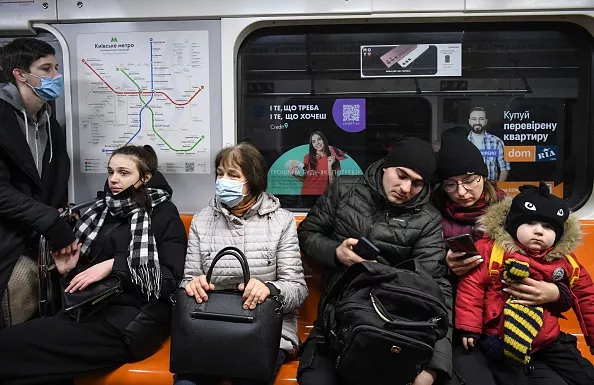
Zelenskiy said that martial law had been declared, and he had appealed to world leaders to impose all possible sanctions on Russia, including on Putin, who he said wanted to destroy the Ukrainian state.
Three hours after Putin gave his order, Russia's defence ministry said it had taken out military infrastructure at Ukrainian air bases and degraded its air defences, Russian media reported.
Earlier, Ukrainian media reported that military command centres in Kyiv and the city of Kharkiv in the northeast had been struck by missiles, while Russian troops had landed in the southern port cities of Odessa and Mariupol.
A Reuters witness later heard three loud blasts in Mariupol. Russian-backed separatists in the east later said they had captured two towns, the RIA news agency reported. There was no immediate comment by authorities in Ukraine.
Hours before the invasion began, the separatists issued a plea to Moscow for help to stop alleged Ukrainian aggression - claims the United States dismissed as Russian propaganda.
Global stocks and US bond yields dived, while the dollar and gold rocketed higher after Putin's address. Brent oil surged past $100/barrel for the first time since 2014.
'Decisive way'
Queues of people waited to withdraw money and buy supplies of food and water in Kyiv, while traffic was jammed going west out of the city towards the Polish border.
Biden, who has ruled out putting US troops on the ground in Ukraine, said Putin had chosen a premeditated war that would bring a catastrophic loss of life and human suffering.
"Russia alone is responsible for the death and destruction this attack will bring, and the United States and its Allies and partners will respond in a united and decisive way," said Biden, who spoke to Zelenskiy by telephone.
French President Emmanuel Macron condemned Russia's action while NATO Secretary-General Jens Stoltenberg said Nato allies would meet to tackle the consequences of Russia's "reckless and unprovoked attack".
UN Secretary-General Antonio Guterres, speaking after the Security Council meeting, made a last-minute plea to Putin to stop the war "in the name of humanity".
'President Putin, in the name of humanity, bring your troops back to Russia:' United Nations Secretary-General Antonio Guterres in a last-minute plea to the Russian president https://t.co/E2OSs3PLZu pic.twitter.com/qfRPUZktJd
— Reuters (@Reuters) February 24, 2022
China reiterated a call for all parties to exercise restraint and rejected a foreign journalist's description of Russia's action as an invasion.
Ukraine closed its airspace to civilian flights citing a high risk to safety, while Europe's aviation regulator warned against the hazards to flying in bordering areas of Russia and Belarus.
Shelling had intensified since Monday when Putin recognised eastern separatist regions as independent and ordered the deployment of what he called peacekeepers, a move the West called the start of the invasion.
In response to Putin's Monday announcement, Western countries and Japan imposed sanctions on Russian banks and individuals but held off their toughest measures until an invasion began.
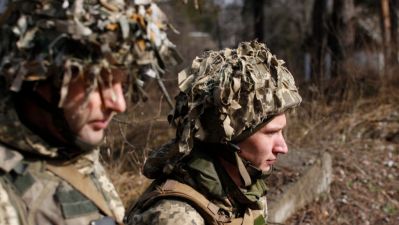
Latvia, a Baltic nation that was once ruled from Moscow but is now a member of Nato and the European Union, said it should prepare for "possible security risks" after Russian forces invaded Ukraine.
"Latvia is safe, we are not under a direct military threat," the Latvian foreign ministry said in a statement on Thursday. "However,
Latvia must also prepare for possible security risks - an unpredictable refugee flow, cyber threats, disinformation attacks, energy resource related challenges."
Meanwhile, Lithuania’s President has said his country has declared a ‘state of emergency’ after the Russian forces invaded Ukraine. - Reuters
